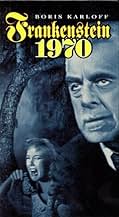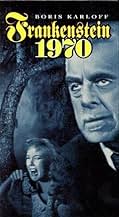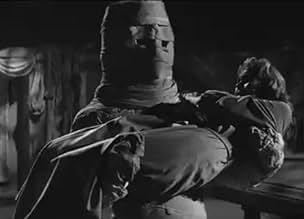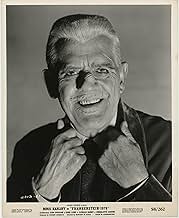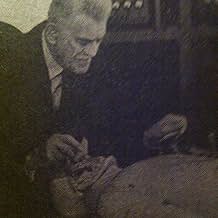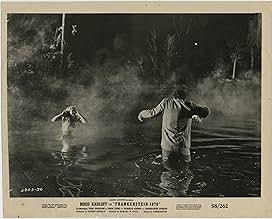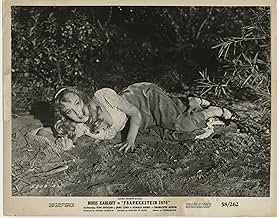Frankenstein 1970
- 1958
- Tous publics
- 1h 23m
Needing money, the last member of the Frankenstein family leases his family's castle out to a film company as he tries to continue his ancestor's gruesome experiments to create life.Needing money, the last member of the Frankenstein family leases his family's castle out to a film company as he tries to continue his ancestor's gruesome experiments to create life.Needing money, the last member of the Frankenstein family leases his family's castle out to a film company as he tries to continue his ancestor's gruesome experiments to create life.
- Douglas Rowe
- (as Donald Barry)
- Assistant Cameraman
- (uncredited)
- Station Porter
- (uncredited)
- Atomic Reactor Expert
- (uncredited)
- Cab Driver
- (uncredited)
- Crew Member
- (uncredited)
Featured reviews
To finance his experiments the last of the Frankensteins (Karloff) allows a film crew to shoot a movie/TV show on the grounds of his estate. Of course the Doc is building a creature down in his secret laboratory. Not only does Frankenstein need cash, he needs a few spare parts for his project as well. The film crew and servants provide him with these - unwillingly of course.
The film crew is really annoying. Seeing them getting bumped off by the bandage-swathed monster is quite fun. Many have complained that Karloff was hamming it up. I disagree as he was dealing with a one-dimensional character.
The ending is kind of predictable. But there are worse ways to spend your time than watching this.
Here, the 70-year-old Karloff plays Victor von Frankenstein, the final descendant of the infamous House. Needing additional funds to purchase the atomic reactor that will enable him to complete his experiments (and at this point, need it even be mentioned what those experiments consist of?), he rents out his ancestral castle near Frankfurt to an American TV production company that is making a movie to celebrate Frankenstein's 240th anniversary. (Never mind that that would make for a birth date of 1730, if the film actually does take place in 1970, and that Mary Shelley's original novel came out in 1818, although admittedly set in "17--." Also, never mind the fact that the film makes no attempt to look as if it's transpiring 12 years in its then future.) But when body parts, such as brains and eyes, are in short supply, what is the good Baron supposed to do, other than use parts from the retainers, film crew and nubile actresses on hand?
"Frankenstein 1970" is a film that I never got to see as a little kid, despite its ubiquitous presence on television back then. When I mentioned to my Psychotronic Guru, Rob, that I had just acquired the DVD to watch, he enthused about the film's opening scene, which he said he'd found terrifying when he saw it in a theater over 50 years ago. Film historian Tom Weaver says the same thing on the DVD's commentary regarding this sequence, in which a claw-taloned maniac pursues a screaming, hysterical blonde through a fog-shrouded landscape and into a swamp, and in truth, that scene IS the best and scariest moment in the film; the only scary moment, as it turns out. For the rest of it, the picture is a tad slow moving, occasionally dull, with many scenes of the Baron puttering around with his creation in his lab, dictating his progress into a running tape recorder. The resultant monster is one of the most ridiculous looking in any Frankenstein film; indeed, swaddled in mummylike wrappings as he is, we never even get a good look at the pathetic thing, until the picture's admittedly startling final moment. A lumbering bundle of bandages, with a head that looks like a giant cardboard box residing under the wrappings, the monster here is an object of laughter, not fright. Eyeball-less as it is, the monster seems to get around just fine, leading the viewer to wonder just why the Baron is so obsessed with procuring orbs for his creation. Besides the monster, the film's laboratory equipment and creation sequence FX pale mightily in comparison to those earlier four Frankenstein films, which all featured stunning-looking lab sets and amazing creation sequences (particularly "Bride"). Still, it must be said that director Howard W. Koch (later, the producer of such classic films as "The Manchurian Candidate," "The President's Analyst," "The Odd Couple" and "Plaza Suite") makes nice use of his CinemaScope frame, that the score by Paul Dunlap is occasionally gripping, and that cinematographer Carl E. Guthrie has provided some moody B&W visuals. The film also offers fans of grisly horror some very mild gross-outs, such as a jar of spilled eyeballs, the massaging of a human heart, Boris' tale of the tongueless commandant, and a corpse-grinding machine (an inspiration for Ted V. Mikels, perhaps?). Basically, however, the film is of interest mainly because of Uncle Boris, who gets to overact deliciously and impress his many fans, once again, with that wonderfully mellifluous voice. As in the 1934 classic "The Black Cat," Boris also gets to play some chilling music on his home organ, always a dismal thrill! Bottom line: Filmed as it was in only eight days (!) in January '58, "Frankenstein 1970," cheezy as it is, remains a surprisingly decent, oddball entertainment. After 1958, fans would have to wait another five years before Karloff's next horror pictures, which he made under director Roger Corman. So this film, and "Grip of the Strangler," had to hold them for a while (in addition to TV's "Thriller," of course, which Boris hosted from 1960-'62). And really, where else can you find a line like "Torch, scorch, unforch"?
Is this a great movie, NO. Is it a fun movie YES! Any movie who has as the the hero "Red" Berry is low budget. It does however have the great Karloff. He is wonderful. His monologue for the "movie in the movie" is great. Karloff was starting to show his incredibly painful arthritis at this time of his life and it does pain one to think of the agony he is going through. But he is Karloff and actually portrays a Frankenstein for the first time in his career. He does not disappoint.
If you love 1950 horrors and you like Karloff you will enjoy this movie. The acting is mediocre (except Karloff) and the Monster Hokey but give it a try.
Did you know
- TriviaThe Breen Office ordered a number of changes in both the film's script and its original cut. One of the changes that was ordered was of the sound of the device that Baron Victor von Frankenstein used to dispose of the body parts that he was using to create his monster. The original grinding sound that the device made while doing so was considered too horrific, so it was replaced with the sound of a flushing toilet, which resulted in unintended laughter from audiences. This was believed for a long time to be the first time ever that the sound of a flushing toilet was heard in a U.S. film. UPDATE: A toilet was also flushed in the film Les Raisins de la colère (1940), which was released 18 years before this one.
- GoofsThe degree of the damage that was done to Baron Victor von Frankenstein's injured left eye changes from scene to scene throughout the entire film.
- Quotes
Baron Victor von Frankenstein: [reading from his ancestor's stone memorial marker] "I, Frankenstein, began my work in the year 1740 A.D. with all good intentions and humane thoughts to the high purpose of probing the secrets of life itself with but one end, the betterment of mankind."
[speaking for himself]
Baron Victor von Frankenstein: So wrote my ancestor, but first he had to learn how flesh is made. He had to discover the art of transplanting vital organs from human beings into his creature and knitting them together until they all had all the attributes of God-inspired birth. Of course, I must admit that perhaps he was not too scrupulous about where he got his raw material.
- ConnectionsFeatured in Chiller Theatre: Frankenstein 1970 (1962)
- How long is Frankenstein 1970?Powered by Alexa
Details
- Release date
- Country of origin
- Official site
- Languages
- Also known as
- Frankenstein contre l'homme invisible
- Filming locations
- Production company
- See more company credits at IMDbPro
Box office
- Budget
- $110,000 (estimated)
- Runtime
- 1h 23m(83 min)
- Color
- Aspect ratio
- 2.35 : 1


